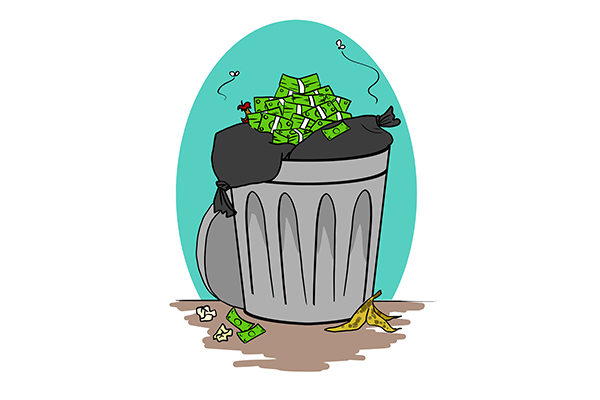University composting loads are racking up hundreds of dollars in contamination fees per week. University Resource Recovery, which is responsible for reusing campus resources, said students should toss their waste in a landfill bin instead of guessing whether it is compostable.
Resource Recovery manager Robert Moddrell said the University Operational Fund, which finances basic facilities maintenance, is paying an Austin compost processor $300 to $400 per week along with the standard $31 per ton. Fees increase because of the non-compostable material in the weekly load, he said, which can cost $500 for three pieces of glass per load. Moddrell said the threshold for what is considered a contaminated load is low.
“It doesn’t take much,” Moddrell said. “With things like glass, it can break and end up in the soil they are selling for people to work in their garden.”
Moddrell said he suspects the compost fees to rise as the volume of compost the university collects increases with the expansion of collections sites as part of the Zero Waste Workplace Initiative.
“Composting is $8 less than landfill (per ton),” Moddrell said. “There is a savings on the overall generation of compost versus landfill, but the fines are eating up that savings.”
These fees fund the labor costs to clean out the contamination from the load, said Noelle Bugaj, organics recycling account manager at the compost processing company Organics By Gosh. She said the company has a team go through the compost to hand-pick out non-compostable materials. Bugaj said a small amount of contamination can affect the whole composting and recycling system.
“The cost of contamination in any kind of processing is really high,” Bugaj said. “It is really important people understand the kind of power they have with just the flick of their wrist. When they throw something into one bin versus the other, they can change the entire system.”
Moddrell said the University does not face any fees from the University recycling processor and in the past made a $50,000 to $60,000 in recycling rebates a year from selling recycled plastic to manufacturers. However, Moddrell said the University is no longer receiving revenue from plastics sales.
“Recycling is in a state of flux right now across the country,” Moddrell said. “This is because the value of plastic has gotten lower, and it has become questionable to deal with.”
He said Resource Recovery is planning to put clearer signage on composting bins. Resource Recovery is also collaborating with University Housing and Dining on the Zero Waste Hero program, a series of classes to teach people about composting and recycling, Moddrell said. UHD sustainability coordinator Neil Kaufman said the Zero Waste Hero program helps solve the issue of “wishful recycling.”
“This is when somebody wants to do the right thing and feels like they are recycling more than they are throwing away,” Kaufman said. “They will recycle and compost things that aren’t actually recyclable or aren’t actually compostable. There is a lot more harm than good in that. They mean well, but it’s wrong.”
Editor's Note: This story has been updated to clarify the rebates made by recycling plastics to manufacturers and to clarify the reason Moddrell expects compost fees to rise.





















